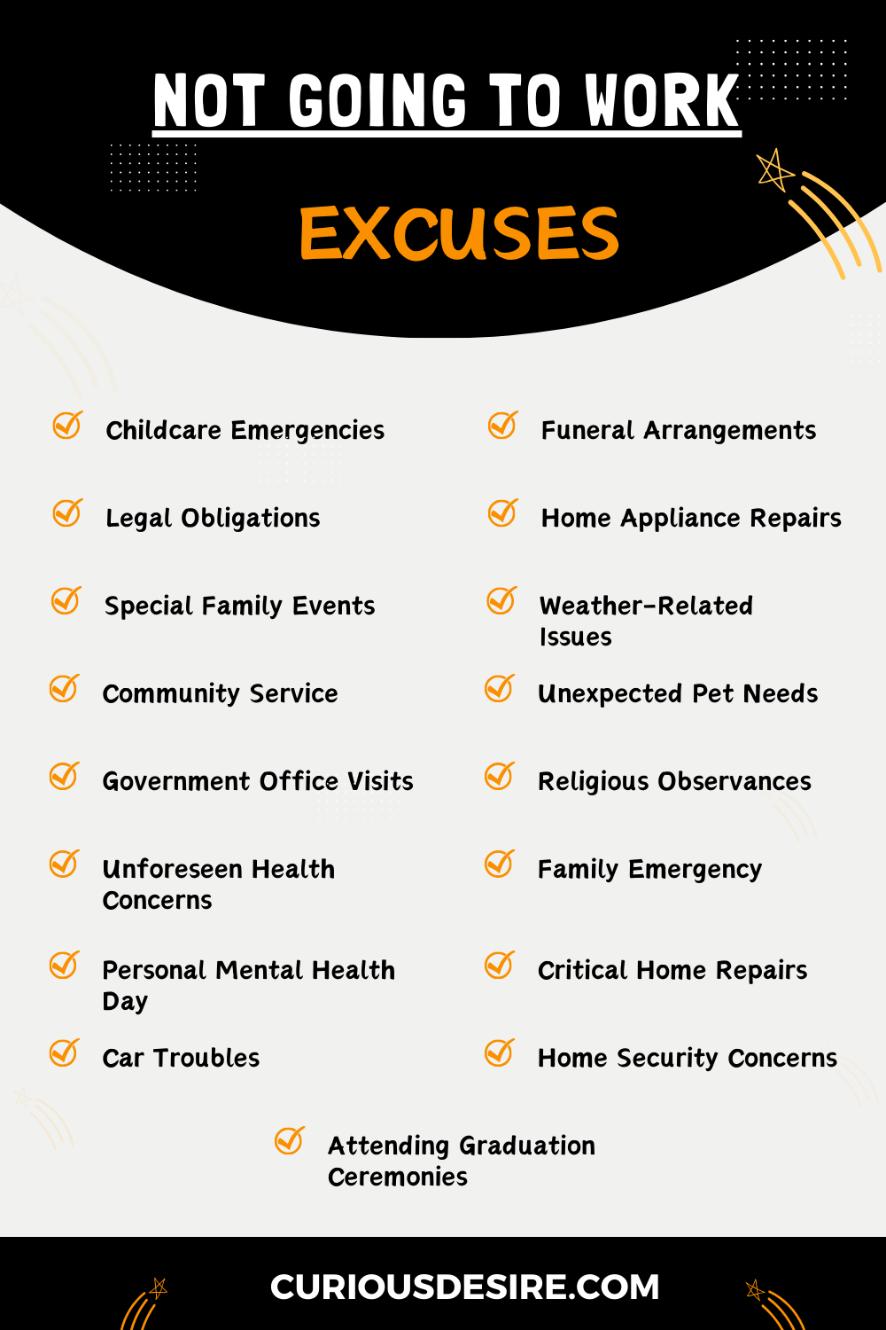Every day, people have to manage both their work and personal lives. It’s like trying to balance on a tightrope.
Being committed to your job is important, but sometimes things happen in our personal lives that we didn’t see coming.
These situations can be important or urgent, making it necessary to take a break from work.
In the list of excuses below, we’ll look at different situations where taking a day off isn’t just something we’d like to do, but something we really have to do.
Let’s explore some common excuses for taking a day off.
[toc]

1. Childcare Emergencies
Sometimes, things go haywire with childcare, like when your usual daycare closes suddenly or your babysitter isn’t available.
When these things happen, you might need a day off to make sure your child is safe and taken care of.
Most bosses get it—they understand that family responsibilities are a big deal.
2. Funeral Arrangements
If someone you know, like a friend or a far-away family member, passes away, you might need some time off to attend the funeral and be there for your family.
You can make it a reason to take a day off.
So, letting your boss know quickly helps them figure out how work will go on without you for a bit.
3. Legal Obligations
Sometimes, you might get a letter asking you to do jury duty or go to court. Your boss knows this is part of being a good citizen.
Taking a day off for these things shows you’re serious about following the rules and doing your part in the justice system.
4. Home Appliance Repairs
Imagine your fridge or washing machine suddenly stops working—it’s a bit of a crisis! But taking a free day from work to get it fixed is a smart move.
So, make it a solid reason and ask for a leave without hesitation.
5. Special Family Events
Birthdays, anniversaries, and other special family moments are important. If you need a day off to be there for these happy times, your boss usually understands.
It’s about having a good balance between work and enjoying important moments with your family.
6. Weather-Related Issues
Bad weather can make going to work tricky and even unsafe.
If the weather is acting up, your boss usually gets that it’s better for you to stay home and stay safe.
Just keep them in the loop about the situation.
7. Community Service Commitments
Giving back to the community or volunteering is awesome! If you need a day off for that, it shows you care about making the world a better place.
Most bosses appreciate employees who take the time for voluntary services.
8. Unexpected Pet Care Needs
Pets are like family, right?
If your furry friend needs a sudden visit to the vet or some extra care, Requesting a day’s break to look after them is totally understandable.
Your boss knows pets are a big deal to you.

9. Banking or Government Office Visits
Sometimes you have to go to the bank or deal with government stuff, and these places are usually open when you’re at work.
Having a break from work to sort out these things is a smart move— doesn’t it make a lot of sense too?
10. Religious Observances
If there’s a special day in your religion that you need to observe, your boss usually respects that. So, you can use it to declare a day off without consequences.
Taking a leave for religious reasons is about honoring your beliefs and contributing to a diverse and understanding workplace.
26. Local Community Involvement
Active participation in local community events, meetings, or initiatives may necessitate time off to contribute to the community.
Demonstrating a commitment to community engagement adds a positive dimension to your professional profile.
27. Transportation Strikes or Disruptions
Unexpected public transportation strikes or disruptions can make commuting to work challenging, requiring a day off.
Employers typically understand the impact of external factors on commute feasibility.
28. Medical Procedures
Scheduled medical procedures, tests, or treatments may require time off for recovery and follow-up appointments.
Communicating the necessity of these medical interventions underscores the commitment to personal health.
29. Unexpected Travel Delays
Unforeseen travel issues, such as flight cancellations or delays, may disrupt return plans and necessitate an additional day off.
Managing travel-related challenges proactively demonstrates responsibility.
30. Parent-Teacher Meetings
Attending parent-teacher conferences or school-related meetings may require a day off for active involvement in your child’s education.
Employers typically support the importance of parental engagement in educational matters.
31. Utility Service Interruptions
Emergency situations like water or power outages at home may require time off to manage and address the issue.
Proactively dealing with home-related emergencies contributes to overall personal stability.
32. Family Counseling or Therapy
Family counseling sessions or therapy appointments may be scheduled during work hours, requiring time off for personal and family well-being.
Recognizing the importance of mental health for both personal and familial dynamics is generally appreciated.
33. Food Poisoning or Allergic Reactions
Sudden illnesses due to food poisoning or allergic reactions may require a day off for recovery and medical attention.
Proactively managing health issues prevents the potential spread of illnesses in the workplace.

34. Unexpected School Closures
Unplanned school closures or emergencies may require a day off to make alternative childcare arrangements.
Communicating the need for childcare flexibility during unexpected school closures fosters understanding.
43. Environmental Concerns
Addressing environmental concerns at home, like pest infestations or hazardous material spills, may require a day off.
Proactively managing these challenges requires time that you can only get by taking a leave.
44. Participation in Civic Events
Active involvement in civic events, protests, or community movements may necessitate time off for personal commitment.
Demonstrating a commitment to civic engagement adds a positive dimension to your professional profile, showcasing your dedication to social responsibility.
45. Unexpected Family Responsibilities
Sudden responsibilities or emergencies related to family members may require immediate attention and time off.
Communicating the urgency of unexpected family responsibilities provides understanding with your employer, demonstrating your commitment to family.
46. Elderly Family Member Support
Providing assistance and support to elderly family members during unexpected health issues or emergencies may require a day off.
Acknowledging the importance of familial responsibilities reflects a commitment to personal obligations, showing that family support matters to you.
47. Renewing Personal Documents
Scheduled appointments for renewing essential personal documents, such as passports or driver’s licenses, might fall during work hours.
It involves the necessity of updating or renewing crucial identification documents, which are essential for legal and personal reasons.
Employers generally recognize the importance of maintaining up-to-date personal documentation.
48. Emergency Fire
In the unfortunate event of a fire, it is a critical emergency that demands immediate attention.
The need to address and manage the aftermath of a fire at your home could require a day off to ensure your safety, assess damages, and coordinate necessary actions with authorities or insurance providers.
49. Someone Broke Into Your Home
Dealing with a break-in at your home is a distressing situation that may involve working with law enforcement, securing your residence, and addressing potential property damage or theft.
Taking an off allows you to manage the immediate aftermath and restore a sense of security at your home.
50. Selling Your House
When involved in selling your house, there are numerous responsibilities and tasks that require attention, such as coordinating with real estate agents, potential buyers, or attending property inspections.
Taking a break from work can be essential for managing these aspects and ensuring a smooth process during this significant life event.
51. Some Software Is Not Working
Technical issues with essential software can significantly impact work efficiency.
Taking a day off to resolve such issues allows for dedicated time to troubleshoot problems, seek technical support, or reinstall software, ensuring a seamless return to productive work.
52. Fix Your Phone
In today’s digitally connected world, a malfunctioning phone can disrupt both personal and professional communication.
In such situations, you can ask for a leave to address phone issues as it is a valid excuse to communicate with your boss.

